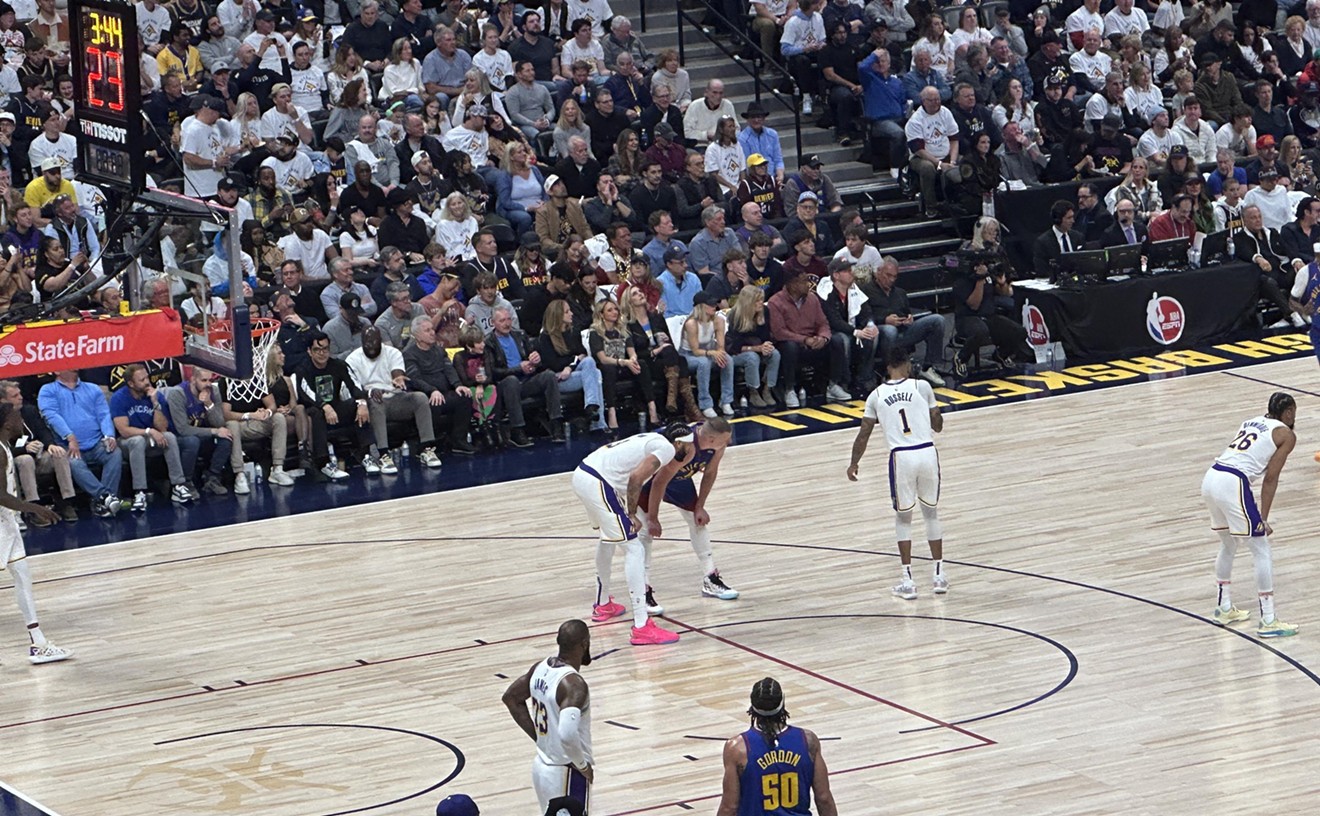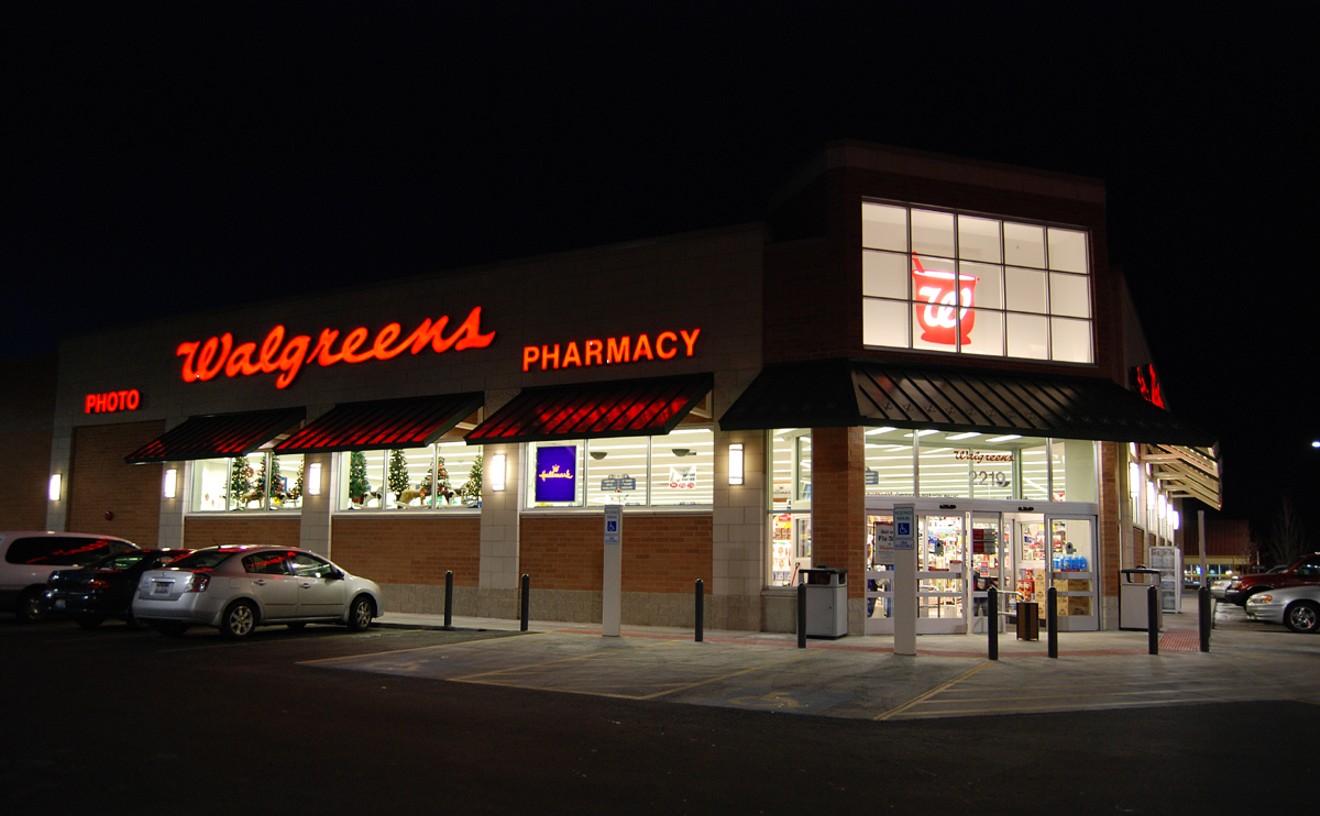Another plaintiff is Mike White, Sr., who was at the theater with his son, Mike White, Jr., during the fateful screening of The Dark Knight Rises. The elder White wasn't physically injured, but his namesake suffered severe wounds.
As we've reported, the two previous suits -- the first jointly filed by Denise Traynom and Brandon Axelrod, the other by Joshua Nowlan, all of whom sustained injuries in the attack -- argue that because of past incidents at the Century 16, including "at least one shooting, involving gang members," plus assaults and robberies, the theater should have had security personnel on hand for the Dark Knight's midnight premiere. The complaints also take Cinemark to task for failing to have alarms that would have alerted employees after Holmes allegedly blocked open the exit door in order to arm himself.
Similar themes are struck in the new suit, which arrives under the auspices of Napoli Bern Ripka Shkolnik & Associates, LLP, a firm that secured an $816.5 million settlement in the aforementioned 9/11-related matter. The "General Allegations" section maintains that the Century 16 "posed an unreasonably dangerous risk to paying customers such as Plaintiffs because Defendants had failed to ensure that the subject premises were safe and secure for its paying customers and were free of the violent crime and the risk of violent crime."
Continue to read more about the suit, as well as to see a video of the news conference and the complete documents. To back up this contention, the suit maintains that prior to July 20, "Defendants were on notice that the subject premises posed an unreasonably dangerous risk to paying customers because it had previously been the site of shootings, robberies and assaults," including a gang shooting reported by the New York Times in August.At times, the theater had hired security personnel to work on Friday and Saturday nights, the suit continues -- but that wasn't the case on July 20. (Security had been on hand earlier on July 19 during a transfer of cash, but had split afterward.) Moreover, the suit notes that the emergency exit door to Auditorium 9, where the attack was centered, lacked an alarm that might have sounded after the assailant, presumed to be James Holmes, blocked it open in order to arm himself and don protective gear. Likewise, no alarm went off after he opened fire, and "no action [was] taken by theater employees to safely evacuate the many people left in Auditorium 9.
As such, the suit says, "the Assailant continued shooting throughout the Auditorium until eventually his weapon jammed and the shooting stopped. He then walked back out of the theater through the same door he used to enter and sat in his car."
Given these events, the suit states that the Defendants "actually knew or should have known" about dangers to patrons -- a duty that was "breached...when it failed to engage in reasonable efforts to inspect the premises and to make the subject premises safe."
The alleged failures are enumerated like so:
a. failed to inspect and/or adequately inspect and ensure that the subject premises was adequately guarded, secure and safe from unauthorized use of the premises as described herein;Continue to read more about the suit, as well as to see a video of the news conference and the complete documents. At a press conference yesterday, Bern insisted that money wasn't the motivation behind the suit. But the suit requests "compensatory damages as proven." Those damages are described like so:b. failed to ensure that alarms would sound when the emergency exits on the subject premises were opened and/or activated;
c. failed to take steps to make sure emergency exit doors could not be propped open and used as an egress and ingress into the theater;
d. failed to employ sufficient staff to monitor all ingresses and egresses;
e. failed to establish policies to monitor all ingresses and egresses and/or enforce such policies and to adequately train their staff to appropriately monitor all ingresses and egresses;
f. failed to provide appropriate security on and within the premises as well as generally failed to adequately secure the premises;
g. failed to use reasonable care under the circumstances to discover the foreseeable dangerous conditions of said premises and to correct same or to warn invitees and/or customers of their existence, as well as other potential risks known to Defendants and of which Defendants were on notice of, when attending movie showings at their theater;
h. failed to properly train employees or provide reasonable surveillance procedures including, but not limited to, surveillance devices, monitors, cameras and human surveillance or monitoring of suspicious activity;
i. failed to develop, establish and institute adequate emergency or first-aid response and evacuation plans and procedures for patrons in the theater in the event circumstances called for such procedures; and
j. failed to properly train employees in emergency, crisis and first-aid response and evacuation procedures.
The Defendants' above-alleged wrongful conduct caused the injuries and damages to the Plaintiffs, including but not limited to: past and future economic damages, including but not limited to medical and related expenses; lost wages; loss of earning capacity; past and future non-economic damages, including but not limited to bodily injury of a serious and permanent nature; pain and suffering; permanent physical disability; inconvenience; emotional stress; anxiety; loss of enjoyment of life; impairment of the quality of life; any and all other consequential losses arising from Defendants' wrongful conduct as provided by law.No formal legal response from Cinemark thus far. But expect its eventual filing to make arguments like those offered in response to the initial two lawsuits. Here are some excerpts from that motion:
The essence of the complaint is that Cinemark "should have known" that James Holmes would commit a mass murderous assault in the Century 16 Theater on July 20.... Federal, state and local law-enforcement entities...would not be expected to foresee Mr. Holmes' criminal conduct.... Family members and friends who knew him personally for multiple years did not foresee it....Note that Cinemark has already announced its intention to reopen the Century 16 sometime early next year -- a plan supported by the City of Aurora.It would be patently unfair, and legally unsound, to impose on Cinemark...the duty and burden to have foreseen and prevented the criminal equivalent of a meteor falling from the sky. Thus, even accepting the allegations in the complaint as true, plaintiffs cannot state a claim that anyone other than Mr. Holmes, the irrational killer, is responsible for the consequences of his criminal conduct.
Look below to see a 9News report about yesterday's press conference. That's followed by the latest lawsuit, and the earlier pair.
More from our Aurora Theater Shooting archive: "James Holmes case: Inside three victims' lawsuits against Aurora theater."











